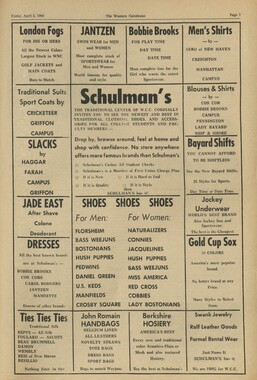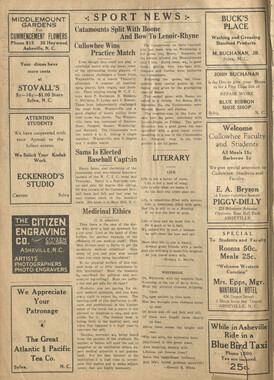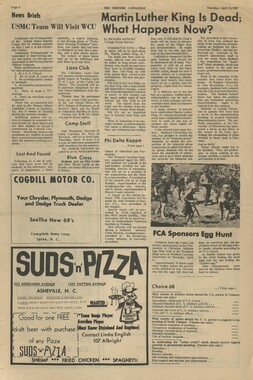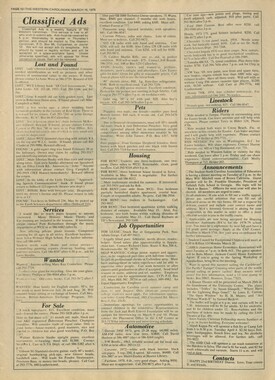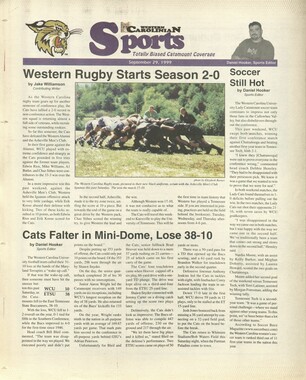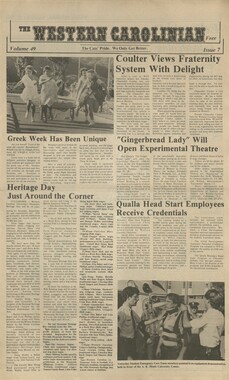Western Carolina University (21)
View all
- Canton Champion Fibre Company (2308)
- Cherokee Traditions (291)
- Civil War in Southern Appalachia (165)
- Craft Revival (1942)
- George Masa Collection (137)
- Great Smoky Mountains - A Park for America (3080)
- Highlights from Western Carolina University (422)
- Horace Kephart (973)
- Journeys Through Jackson (159)
- LGBTQIA+ Archive of Jackson County (89)
- Oral Histories of Western North Carolina (318)
- Picturing Appalachia (6617)
- Stories of Mountain Folk (413)
- Travel Western North Carolina (153)
- Western Carolina University Fine Art Museum Vitreograph Collection (129)
- Western Carolina University Herbarium (92)
- Western Carolina University: Making Memories (738)
- Western Carolina University Publications (2491)
- Western Carolina University Restricted Electronic Theses and Dissertations (146)
- Western North Carolina Regional Maps (71)
- World War II in Southern Appalachia (131)
University of North Carolina Asheville (6)
View all
- Allanstand Cottage Industries (62)
- Appalachian National Park Association (53)
- Bennett, Kelly, 1890-1974 (1463)
- Berry, Walter (76)
- Brasstown Carvers (40)
- Carver, George Washington, 1864?-1943 (26)
- Cathey, Joseph, 1803-1874 (1)
- Champion Fibre Company (233)
- Champion Paper and Fibre Company (297)
- Cherokee Indian Fair Association (16)
- Cherokee Language Program (22)
- Crowe, Amanda (40)
- Edmonston, Thomas Benton, 1842-1907 (7)
- Ensley, A. L. (Abraham Lincoln), 1865-1948 (275)
- Fromer, Irving Rhodes, 1913-1994 (70)
- George Butz (BFS 1907) (46)
- Goodrich, Frances Louisa (120)
- Grant, George Alexander, 1891-1964 (96)
- Heard, Marian Gladys (60)
- Kephart, Calvin, 1883-1969 (15)
- Kephart, Horace, 1862-1931 (313)
- Kephart, Laura, 1862-1954 (67)
- Laney, Gideon Thomas, 1889-1976 (439)
- Masa, George, 1881-1933 (61)
- McElhinney, William Julian, 1896-1953 (44)
- Niggli, Josephina, 1910-1983 (10)
- North Carolina Park Commission (105)
- Osborne, Kezia Stradley (9)
- Owens, Samuel Robert, 1918-1995 (11)
- Penland Weavers and Potters (36)
- Roberts, Vivienne (15)
- Roth, Albert, 1890-1974 (142)
- Schenck, Carl Alwin, 1868-1955 (1)
- Sherrill's Photography Studio (2565)
- Southern Highland Handicraft Guild (127)
- Southern Highlanders, Inc. (71)
- Stalcup, Jesse Bryson (46)
- Stearns, I. K. (213)
- Thompson, James Edward, 1880-1976 (226)
- United States. Indian Arts and Crafts Board (130)
- USFS (683)
- Vance, Zebulon Baird, 1830-1894 (1)
- Weaver, Zebulon, 1872-1948 (58)
- Western Carolina College (230)
- Western Carolina Teachers College (282)
- Western Carolina University (2008)
- Western Carolina University. Mountain Heritage Center (18)
- Whitman, Walt, 1819-1892 (10)
- Wilburn, Hiram Coleman, 1880-1967 (73)
- Williams, Isadora (3)
- Cain, Doreyl Ammons (0)
- Crittenden, Lorraine (0)
- Rhodes, Judy (0)
- Smith, Edward Clark (0)
- Appalachian Region, Southern (3032)
- Asheville (N.C.) (1945)
- Avery County (N.C.) (26)
- Blount County (Tenn.) (195)
- Buncombe County (N.C.) (1680)
- Cherokee County (N.C.) (283)
- Clay County (N.C.) (556)
- Graham County (N.C.) (238)
- Great Smoky Mountains National Park (N.C. and Tenn.) (525)
- Haywood County (N.C.) (3573)
- Henderson County (N.C.) (70)
- Jackson County (N.C.) (4925)
- Knox County (Tenn.) (35)
- Knoxville (Tenn.) (13)
- Lake Santeetlah (N.C.) (10)
- Macon County (N.C.) (421)
- Madison County (N.C.) (216)
- McDowell County (N.C.) (39)
- Mitchell County (N.C.) (135)
- Polk County (N.C.) (35)
- Qualla Boundary (982)
- Rutherford County (N.C.) (78)
- Swain County (N.C.) (2185)
- Transylvania County (N.C.) (270)
- Watauga County (N.C.) (12)
- Waynesville (N.C.) (86)
- Yancey County (N.C.) (72)
- Aerial Photographs (3)
- Aerial Views (60)
- Albums (books) (4)
- Articles (1)
- Artifacts (object Genre) (228)
- Bibliographies (1)
- Biography (general Genre) (2)
- Cards (information Artifacts) (38)
- Clippings (information Artifacts) (192)
- Copybooks (instructional Materials) (3)
- Crafts (art Genres) (622)
- Depictions (visual Works) (21)
- Design Drawings (1)
- Digital Moving Image Formats (2)
- Drawings (visual Works) (185)
- Envelopes (101)
- Exhibitions (events) (1)
- Facsimiles (reproductions) (1)
- Fiction (general Genre) (4)
- Financial Records (12)
- Fliers (printed Matter) (67)
- Glass Plate Negatives (381)
- Guidebooks (2)
- Internegatives (10)
- Interviews (823)
- Land Surveys (102)
- Letters (correspondence) (1045)
- Manuscripts (documents) (618)
- Maps (documents) (177)
- Memorandums (25)
- Minutes (administrative Records) (59)
- Negatives (photographs) (6090)
- Newsletters (1290)
- Newspapers (2)
- Notebooks (8)
- Occupation Currency (1)
- Paintings (visual Works) (1)
- Pen And Ink Drawings (1)
- Periodicals (194)
- Personal Narratives (10)
- Photographs (12977)
- Plans (maps) (1)
- Poetry (6)
- Portraits (4568)
- Postcards (329)
- Programs (documents) (181)
- Publications (documents) (2444)
- Questionnaires (65)
- Relief Prints (26)
- Sayings (literary Genre) (1)
- Scrapbooks (282)
- Sheet Music (2)
- Slides (photographs) (402)
- Songs (musical Compositions) (2)
- Sound Recordings (802)
- Specimens (92)
- Speeches (documents) (18)
- Tintypes (photographs) (8)
- Transcripts (329)
- Text Messages (0)
- A.L. Ensley Collection (275)
- Appalachian Industrial School Records (7)
- Appalachian National Park Association Records (336)
- Axley-Meroney Collection (2)
- Bayard Wootten Photograph Collection (20)
- Bethel Rural Community Organization Collection (7)
- Blumer Collection (5)
- C.W. Slagle Collection (20)
- Canton Area Historical Museum (2110)
- Carlos C. Campbell Collection (462)
- Cataloochee History Project (64)
- Cherokee Studies Collection (4)
- Daisy Dame Photograph Album (5)
- Daniel Boone VI Collection (1)
- Doris Ulmann Photograph Collection (112)
- Elizabeth H. Lasley Collection (1)
- Elizabeth Woolworth Szold Fleharty Collection (4)
- Frank Fry Collection (95)
- George Masa Collection (173)
- Gideon Laney Collection (452)
- Hazel Scarborough Collection (2)
- Hiram C. Wilburn Papers (28)
- Historic Photographs Collection (236)
- Horace Kephart Collection (861)
- Humbard Collection (33)
- Hunter and Weaver Families Collection (1)
- I. D. Blumenthal Collection (4)
- Isadora Williams Collection (4)
- Jesse Bryson Stalcup Collection (47)
- Jim Thompson Collection (224)
- John B. Battle Collection (7)
- John C. Campbell Folk School Records (80)
- John Parris Collection (6)
- Judaculla Rock project (2)
- Kelly Bennett Collection (1482)
- Love Family Papers (11)
- Major Wiley Parris Civil War Letters (3)
- Map Collection (12)
- McFee-Misemer Civil War Letters (34)
- Mountain Heritage Center Collection (4)
- Norburn - Robertson - Thomson Families Collection (44)
- Pauline Hood Collection (7)
- Pre-Guild Collection (2)
- Qualla Arts and Crafts Mutual Collection (12)
- R.A. Romanes Collection (681)
- Rosser H. Taylor Collection (1)
- Samuel Robert Owens Collection (94)
- Sara Madison Collection (144)
- Sherrill Studio Photo Collection (2558)
- Smoky Mountains Hiking Club Collection (616)
- Stories of Mountain Folk - Radio Programs (374)
- The Reporter, Western Carolina University (510)
- Venoy and Elizabeth Reed Collection (16)
- WCU Gender and Sexuality Oral History Project (36)
- WCU Mountain Heritage Center Oral Histories (25)
- WCU Oral History Collection - Mountain People, Mountain Lives (71)
- WCU Students Newspapers Collection (1923)
- Western North Carolina Tomorrow Black Oral History Project (69)
- William Williams Stringfield Collection (2)
- Zebulon Weaver Collection (109)
- African Americans (390)
- Appalachian Trail (35)
- Artisans (521)
- Cherokee art (84)
- Cherokee artists -- North Carolina (10)
- Cherokee language (21)
- Cherokee pottery (101)
- Cherokee women (208)
- Church buildings (190)
- Civilian Conservation Corps (U.S.) (111)
- College student newspapers and periodicals (2012)
- Dams (108)
- Dance (1023)
- Education (222)
- Floods (63)
- Folk music (1015)
- Forced removal, 1813-1903 (2)
- Forest conservation (220)
- Forests and forestry (1198)
- Gender nonconformity (4)
- Great Smoky Mountains National Park (N.C. and Tenn.) (181)
- Hunting (47)
- Landscape photography (25)
- Logging (122)
- Maps (83)
- Mines and mineral resources (9)
- North Carolina -- Maps (18)
- Paper industry (38)
- Postcards (255)
- Pottery (135)
- Railroad trains (72)
- Rural electrification -- North Carolina, Western (3)
- School integration -- Southern States (2)
- Segregation -- North Carolina, Western (5)
- Slavery (5)
- Sports (452)
- Storytelling (243)
- Waterfalls -- Great Smoky Mountains (N.C. and Tenn.) (66)
- Weaving -- Appalachian Region, Southern (280)
- Wood-carving -- Appalachian Region, Southern (328)
- World War, 1939-1945 (173)
Western Carolinian Volume 68 Number 09
Item
Item’s are ‘child’ level descriptions to ‘parent’ objects, (e.g. one page of a whole book).
-
-
guest commentary Pundits-R-Us By Jim Shea | The Hartford Courant _ Shea is a columnist for The Courant. Stuck in a dead-end job? Searching for a career in which you can work less, make more, and maximize your limited potential? Perhaps it is time you considered the glamorous world of political punditry. If you like the sound of your own voice. If you are one of those people who doesnt let knowing absolutely nothing about a subject 2 interfere with having a strong opinion. And if you are looking for a field that is large enough to accommodate your exaggerated sense of self-importance. Then you owe it to yourself to pick up the phone and call 1- 800-Gas-bags. Here at the Famous Pundits School in Westport, Conn., we offer a comprehensive program leading to an advanced degree - doctor of mundane letters in political punditry. Listen to what some of our graduates have to say: Before enrolling at the Famous Pundits School, I had no outlet for the hate and venom that consumed me. Now I am able to spew to a national audience. Ann Coulter. Thanks to the Famous Pundits School, I have learned to offer analysis that offends no one, and gets me invited to all of the fabulous Washington insider parties. Cokie Roberts. I was just another loud-mouth political hack at the end of the bar until I studied at the Famous Pundits School. Today, I get to shout at the nations leaders on my own television show. Chris Matthews. Yes, in just 30 days, you too can be arguing policy, predicting elections and shaping public opinion while carrying the laminated credentials of a real live journalist. No background? No experience? No problem. If you can keep a straight face, you can be a political pundit. So what are you waiting for? Right now, for just $100 down and $49.95 a month, you can become a full-time student at the Famous Pundits School, where you will learn from a distinguished faculty that includes such high profile pundits as: Tim Russert: (Making Poll Numbers Seem Complicated.) Robert Novak: (Outing Without Conscience.) James Carville: (Schticking With Your Convictions.) George Will: (The Power of Prissy.) The curriculum also concentrates on developing the key skills every political pundit needs to succeed: Passing off other peoples opinions as your own. Accepting the official spin as gospel. Identifying colleagues as informed sources. Becoming friends with the people you cover. And, realizing the danger of expressing an original thought. So call now, with the presidential election approaching, classes are filling up quickly. Operators are standing by. 2004 Distributed by the Los Angeles Times-Washington Post News Service OPINION | All Jobs Count The following editorial first appeared in The Washington Post: Nobody can say for sure how many U.S. jobs will be offshored to places such as India, but the best estimates are around 3.5 million between now and 2015. If that number sounds scary, try this one: The total number of U.S. jobs destroyed over the same period is likely to be well over 300 million. Capitalism eliminates jobs constantly, but except during recessions it creates new ones even more quickly: In 1999 alone, 33 million jobs were destroyed and 36 million created. In short, the loss of a few hundred thousand jobs per year to offshoring is a small part of the churning that goes on in the U.S. labor market. Precisely because every job loss is painful, it makes more sense to think of ways of stimulating employment generally than to craft legislation to address 1 percent of the problem. That has not stopped state and federal legislators from touting 1 percent solutions. Sen. John F. Kerry, the leader in the race for the Democratic presidential nomination, has sponsored a measure to require phone-based service workersIT support people and so onto inform callers of their location. A measure buried in the recently signed omnibus spending bill stipulates that certain work for the federal government may not be done overseas. According to the National Foundation for American Policy, more than 30 bills have been introduced in more than 20 states, including Virginia and Maryland, seeking to regulate or slow offshoring. These efforts are misguided, and not just because they are the equivalent of trying to stop illegal immigration by reinforcing the patrol on a 10-mile section of the Mexican border. Why, for example, is it important that consumers know if their call is being answered in Bangalore or Austin? If the service is poor, they can take their business elsewhere; if the service is good, whats the difference? The answer is that there isnt any difference, which is why there is no consumer outrage on this issue. There is, however, political outrage, reflecting insecurity over jobsinsecurity that really reflects the lack of new job creation in the economy overall, not the small phenomenon of offshoring. Restrictions on government contract work being done abroad are no more logical. If pursued at a federal level, they undermine the U.S. position in global trade diplomacy: The United States has pressed for government procurement around the world to be open to international competition. At a state level, procurement restrictions create a new layer of red tape that is more costly than its worth. In New Jersey, for example, a contract with a call center was canceled because 12 jobs would have moved abroad; the extra cost to the states taxpayers was $900,000. Marylanders, beware: Two bills restricting state contracts are floating around the legislature. Politicians want to be seen responding to the job anxiety of the moment. But they would do better to think big about the job market. They should struggle to improve public education. They should invest more in retraining for laid-off workers. They should minimize taxes that directly penalize job creation. And they should fight against changes in the tax code that benefit the wealthy, exacerbating the inequality that technology and globalization tend to accentuate. 2004 The Washington Post Cheneys Economy On Tuesday evening, March 2, Vice President Cheney offered a curious take on the economic cycle. Speaking on Fox News, he said, What the Demo- crats are offering at this point are tax increases, at exactly the wrong time, and he added that the nascent recovery would be choked off by his opponents policies. Not only does this overlook the fact that Democratic policies would not be implemented until next year, assuming the election went their way, it misses the signs of overheating that are gathering in the economy right now. The day of Cheneys interview, Federal Reserve Chairman Alan Greenspan signaled that interest rates would have to rise to forestall inflation, though he was vague about the timing. Cheney no doubt knows that tax policy ought not be linked to the economic cycle anyway; changes in tax law take so long that its better to leave fine-tuning to the nimbler Fed. But since he has posited the link, we invite him to consider the following: Inflation was dormant in the 1990s because of low commodity prices, cheap oil, cheap Asian imports and a strong dollar. But in recent months commodity prices have been rising, and the Organization of Petroleum Exporting Countries has been cutting production to keep oil prices high. Several East Asian economies are experiencing modest inflation, which may feed through into the prices of their exports to the United States. The sharp fall in the dollar against the euro and the British pound has made imports from those trading partners more expensive. Admittedly, strong productivity growth, another reason for past low inflation, has not dried up. But with economic growth roaring along at an unsustainably high rate, Greenspan is right that the engine will need to be cooled soon. For the past three years or so, the Bush administration has justified its irresponsible budget deficits by pointing to the need to stimulate a sluggish economy. It was never a good argument, but the return of inflationary pressure has made it even worse. 2004 The Washington Post LEN A OID OG oa OBR 4 PHS GHATS SLA I ing AAA ARR ALA AAA PAA 2D
Object
Object’s are ‘parent’ level descriptions to ‘children’ items, (e.g. a book with pages).
-
The Western Carolinian is Western Carolina University's student-run newspaper. The paper was published as the Cullowhee Yodel from 1924 to 1931 before changing its name to The Western Carolinian in 1933.
-





























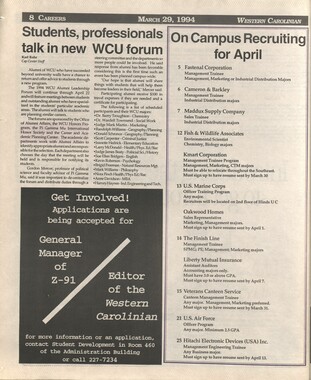


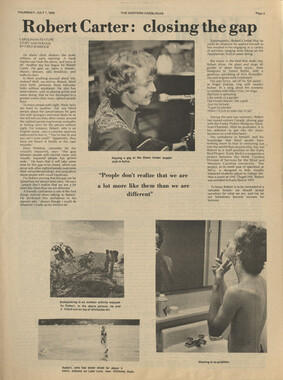
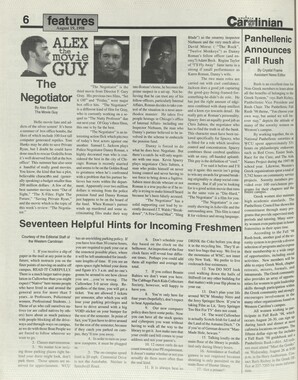

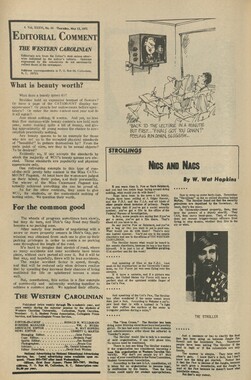
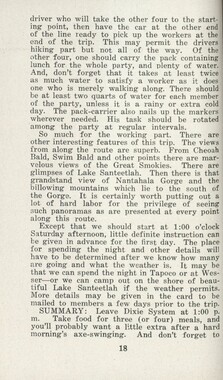
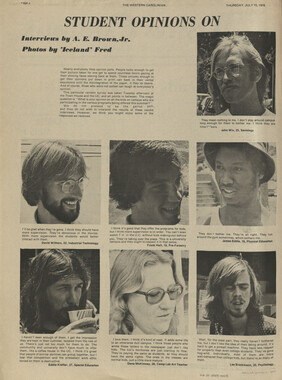


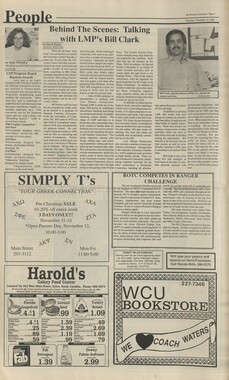

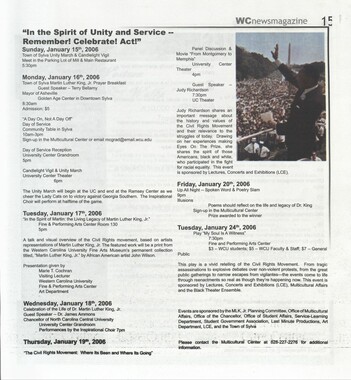
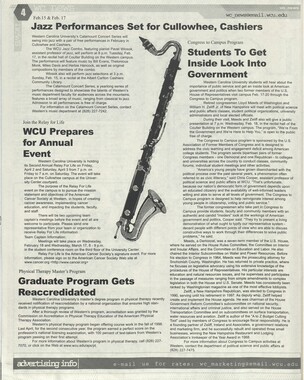
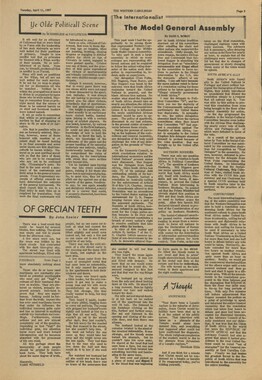
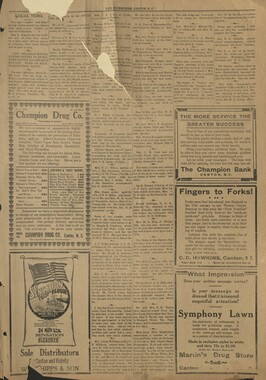
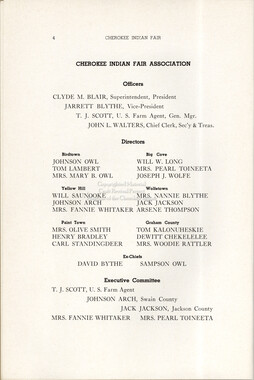
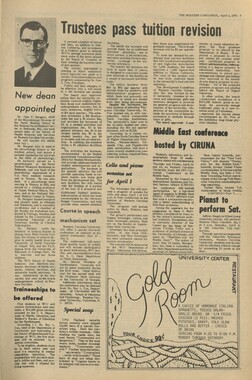
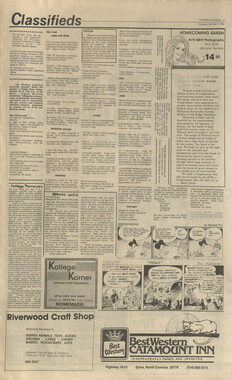
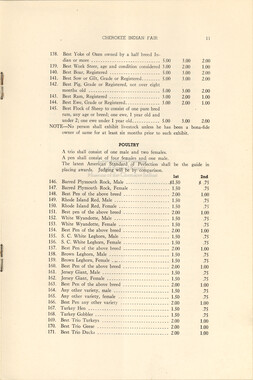

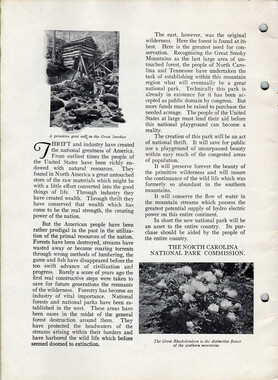

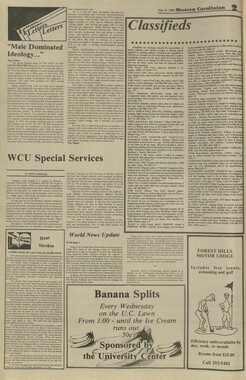
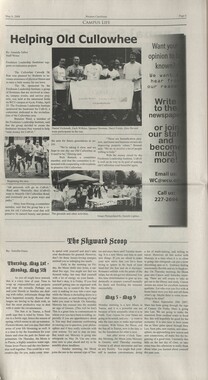


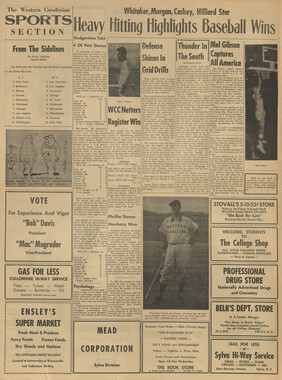

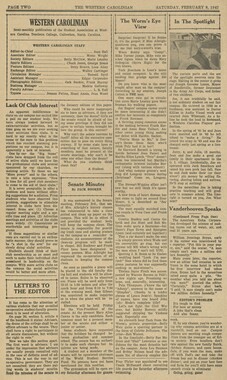

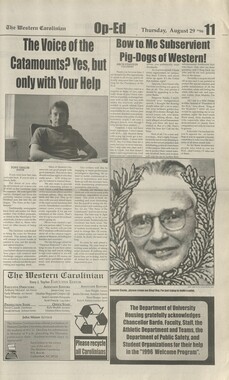

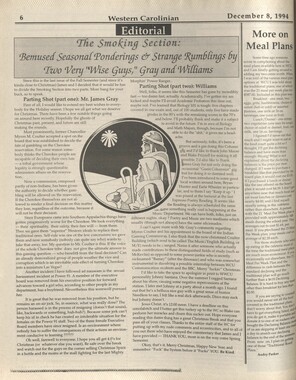
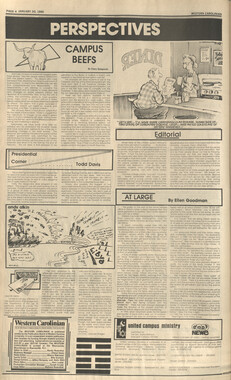
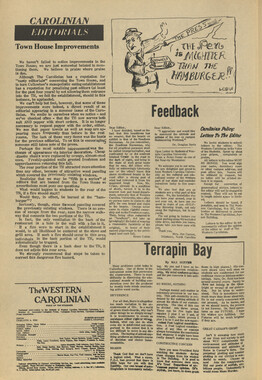

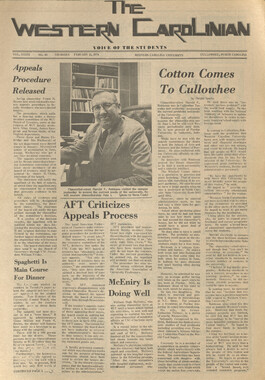

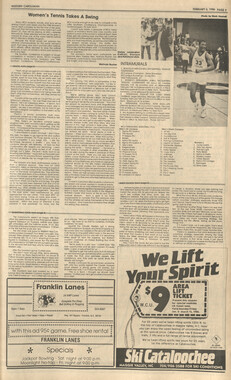
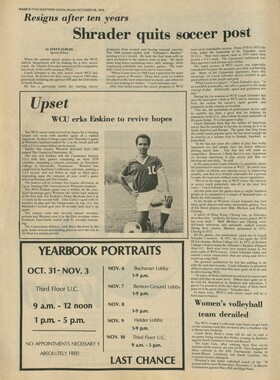

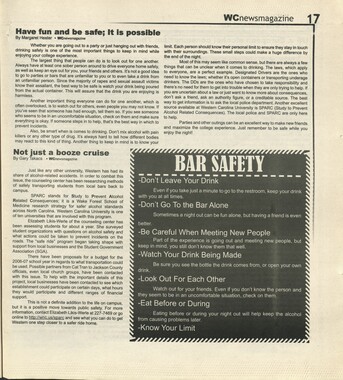
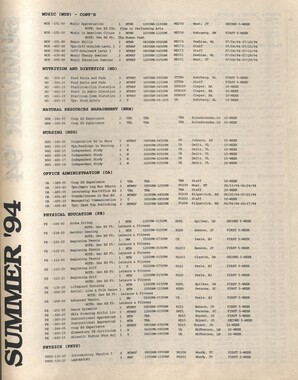
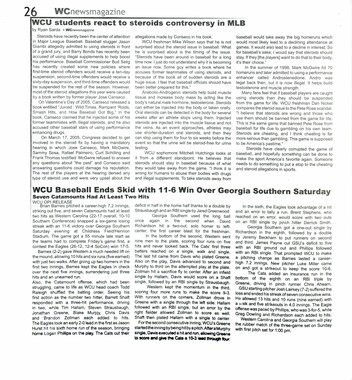

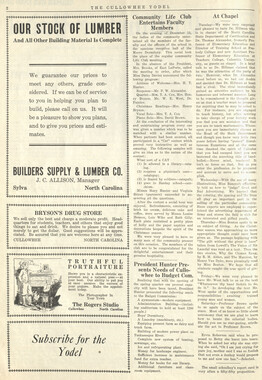
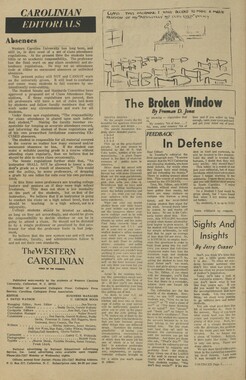

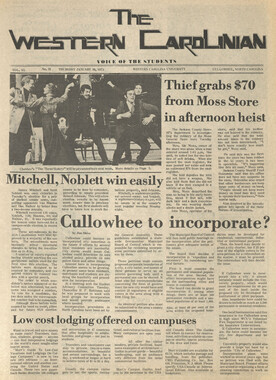
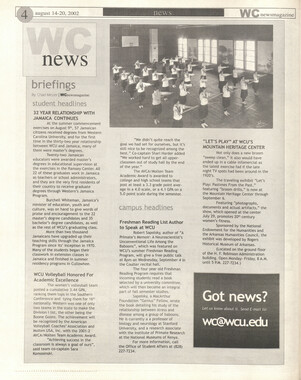
![hl_westerncarolinian_2004_[vol69_no03]_05.jpg](/media/w400h300/wcu_publications/hl_westerncarolinian_2004_[vol69_no03]_05.jpg)


